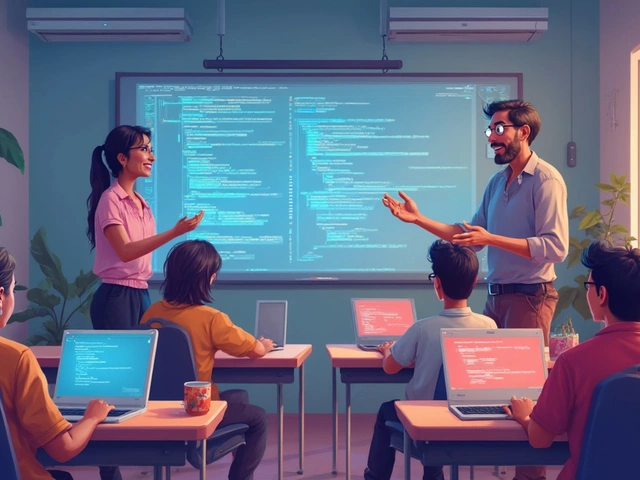
So, you're thinking about diving into vocational qualifications, huh? Well, you're onto something pretty great. These qualifications are all about getting you the practical skills you need to jump straight into the workforce. Think less theoretical stuff and more hands-on experience in fields like plumbing, healthcare, or even graphic design.
The idea is pretty simple: if you know you want to work in a specific industry, why spend loads of time and money on a traditional degree that’s not tailored to your goals? Instead, these courses get you job-ready quickly. You learn exactly what you need, no fluff.
Oh, and here’s a fun fact: vocational courses often cost less than traditional college routes and take less time. Plus, many programs offer part-time or online options, which is perfect if you need some flexibility in your life. It’s all about finding what works for you!
- What Are Vocational Qualifications?
- Benefits of Vocational Courses
- Popular Vocational Fields
- How to Choose the Right Program
What Are Vocational Qualifications?
Vocational qualifications are basically your ticket to gaining practical, job-ready skills without burning through years at a university. They're designed to prep you for specific jobs, ensuring you hit the ground running once you finish the course. These qualifications can range from short-term courses to diplomas that offer a deeper dive into a trade or industry.
Now, you might wonder why more people are leaning towards vocational training. Well, the beauty of it lies in its targeted nature. Instead of spending time on general education, these programs zero in on career-specific training. Daria Johnson, an education consultant, puts it elegantly:
"Vocational qualifications strip out the distractions and focus purely on the essential skills and knowledge needed on the job."
These qualifications often blend classroom learning with on-the-job training. For example, you might spend some weeks in a classroom, then hit a real-world setting like a hotel kitchen if you're pursuing culinary arts. This structure helps in cementing what you’ve learned with practical application.
Types of Vocational Qualifications
There's a whole range of qualification levels you can aim for, depending on where you want to start or go:
- Certificate I-IV: This is like your stepping stone, offering foundational to intermediate knowledge in a specific trade.
- Diploma: This takes things a notch higher, diving deeper into the skills and expertise required.
- Advanced Diploma: Aimed for those who want to reach a higher level of competence in a vocational area.
One should also note that vocational qualifications aren't just for those fresh out of school. Professionals looking to upskill or change careers find these courses invaluable too.
Did you know that workplaces increasingly value these qualifications? According to a 2023 report from the Skilled Employment Authority, about 70% of employers would consider a candidate with vocational training over a traditional degree, if the skills align with their needs. The numbers speak for themselves!
Benefits of Vocational Courses
Vocational courses are pretty awesome when you think about it. They're all about preparing you for real-world jobs with skills you can start using right away. Let’s dig a bit deeper into why these courses are a smart choice for a lot of folks.
Fast-Track to Employment
If speed is your thing, vocational qualifications are perfect. Typically, they take much less time compared to a traditional four-year degree. Some programs can have you ready for the job market in just a few months!
Cost-Effective Education
Not only do they take less time, but they also usually cost a lot less. If you’re concerned about student loans and debt, these courses can be a way to save some serious cash. You get to learn only the stuff you need without all the extra bells and whistles.
Hands-On Learning
This is a biggie. Vocational courses focus on skilled work, which means you get hands-on training. Whether it's welding, culinary training, or dental assistance, you’re doing the actual work rather than just reading about it. This type of learning sticks with you.
Industry Connections
These programs often partner with local businesses, helping you build an industry network even before you graduate. It’s like having a foot in the door because you're learning from those who know the game.
Flexible Learning Options
- Part-time classes
- Online courses
- Evening or weekend schedules
This flexibility makes vocational courses ideal for anyone who's balancing a job or family responsibilities. You learn at your own pace, fitting it into your busy life.
Filling Skill Gaps
The demand for skilled labor is always growing. Many industries face a shortage of qualified workers. Vocational qualifications equip you with the skills that employers are desperately looking for, making you a hot commodity in the job market.
With so much to offer, it's no wonder vocational courses are getting more popular these days. Whether you're looking to kick-start a career or make a life change, these programs can be a ticket to a brighter future.

Popular Vocational Fields
Wondering what areas you can explore with vocational qualifications? There are quite a few! Many of these paths lead to careers that are in high demand and offer solid job security.
Healthcare
This is a massive field with loads of opportunities. Programs in nursing, medical assisting, and phlebotomy are super popular. With healthcare constantly evolving and the demand for skilled workers rising, vocational training here can quickly land you a job in hospitals, clinics, or other medical facilities.
Information Technology
If you're tech-savvy, IT might be your calling. Courses in computer support, cybersecurity, and network administration are hot right now. The tech industry is booming, and getting certified can set you up for roles like an IT specialist or network administrator pretty fast.
Trades
Never underestimate the power of the trades. Whether it's plumbing, electrical work, or carpentry, these jobs are always needed. They're practical, hands-on, and can offer a great career with decent pay. Plus, you'll have skills you can use anywhere.
Culinary Arts
Love food? Why not make a career out of it! Culinary programs teach you the ins and outs of cooking, baking, and managing a kitchen. These skills can take you from a hometown café to a bustling city restaurant.
| Field | Average Starting Salary |
|---|---|
| Healthcare | $35,000 - $50,000 |
| Information Technology | $40,000 - $60,000 |
| Trades | $30,000 - $45,000 |
| Culinary Arts | $25,000 - $40,000 |
In the end, choosing one of these fields depends on your interests and where you see yourself thriving. With vocational courses, you're setting yourself up to jump into the workforce with practical, valuable skills.
How to Choose the Right Program
Picking the right vocational qualifications can feel like a big decision, but don't stress. There are some helpful tips to make sure you’re headed in the right direction. It’s all about finding a program that fits your goals, schedule, and learning style.
Assess Your Interests and Goals
First off, think about your interests and career goals. Do you love working with your hands, or are you more drawn to tech? Knowing what you enjoy and where you see yourself in the future can guide your decision. Some programs focus more on trades, like carpentry or plumbing, while others might lean toward creative skills, like graphic design or culinary arts.
Research the Program Details
Not all programs are created equal, so dig into the details. Consider the length of the program, the cost, and what kind of support or resources they offer. Look for programs that provide real-world experience, like internships or apprenticeships. This hands-on training is crucial for building job-ready skills.
Consider Flexibility and Convenience
If you’re balancing other commitments, such as a job or family, look for programs with flexible scheduling. Many vocational courses offer part-time or online options, letting you learn at your own pace. This flexibility can make a huge difference in how well you handle the coursework.
Check for Accreditation
Accreditation is a biggie. An accredited program has been assessed for quality and rigor by an official body. This recognition can boost your credentials when you enter the workforce. It's like having a stamp of approval that employers trust.
Compare Outcomes
Finally, check out what past students have to say. Look at job placement rates or success stories. Programs with high employment rates post-graduation mean they might be doing something right. Reviews and testimonials can provide insight into what to expect.
In summary, choosing the right vocational courses is about aligning with your passions and the practicalities of your life. Take your time, do your homework, and you'll find a program that's a perfect match for you.
More Articles

Salary of an MBBS Doctor in the USA: Everything You Need to Know
Becoming an MBBS doctor in the USA is an attractive career path due to the promising earning potential. However, salaries can vary widely based on specialization, location, and experience. This article explores what doctors can expect to earn, with tips for those planning a medical career in the States. We also highlight intriguing facts about the medical profession and how international graduates can pursue opportunities in the USA.

Understanding the Key Differences Between Coding and Programming
Ever wondered what makes coding different from programming? Dive into this article to understand how coding is the specific act of writing a script in a friendly language for computers, while programming encompasses a broader scope. With interesting facts and practical tips, you'll grasp the nuances between these terms often used interchangeably. Discover how coding forms a subset of programming and what skills are essential for each. Get ready to enhance your knowledge if you're stepping into the tech field!

Understanding Low Salaries in Government Services and Their Impact
The article dives into the reasons behind low salaries for government services, focusing on factors like budget constraints and traditional pay structures. It also explores how these salaries compare to the private sector and the implications for job seekers. Tips for aspiring government employees to navigate these challenges are included. The piece aims to help readers make informed decisions on pursuing government careers.
